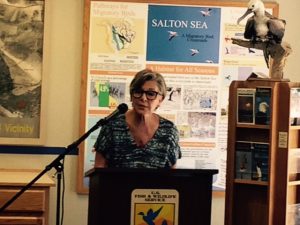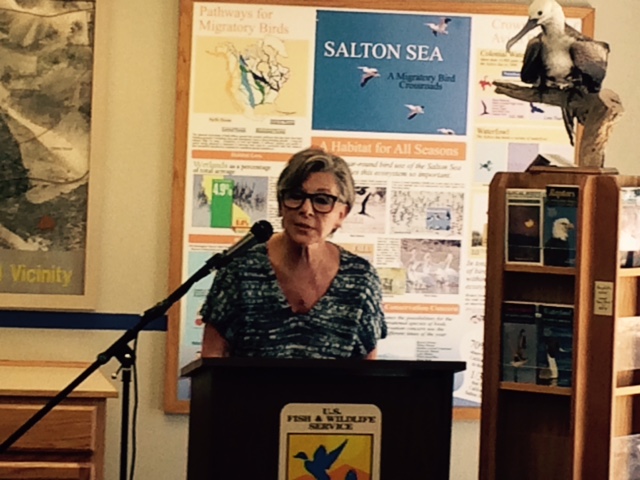
Sen. Barbara Boxer speaks to stakeholders and the media at the Salton Sea National Wildlife Refuge Aug. 18 regarding the need to continue restoration efforts.
On Aug. 18, as temperatures in the Imperial Valley soared past 106 degrees, Sen. Barbara Boxer, D-Calif, visited the Salton Sea to receive an update on projects and to urge both the state and federal governments to move more quickly toward addressing the issue of restoration at the sea. Boxer, whose long career in office is nearing an end, met with local, state and federal officials at the Sony Bono National Wildlife Refuge for a roundtable discussion, then toured the earth work underway at the Red Hill Marina wetlands project, and ended her visit with comments to the media in which she called for immediate action. She praised local efforts in the region. She also voiced support for the state’s Salton Sea Management Program led by Bruce Wilcox, deputy secretary for Salton Sea Policy under California Natural Resources. Boxer further praised Gov. Edmund G. Brown’s administration for awarding $80.5 million in this year’s budget for the sea. However, she said more must be done to secure funding and to move projects, like Red Hill Marina, to fruition.
Boxer’s briefing at the sea was significant for a number of reasons.
For one, she pointed out that time is of the essence as the mitigation water provided to the sea since 2003 ends in 2018. However, she also stated the drought contingency talks between California and other basin states to help manage Lake Mead levels –talks that would potentially call on California to conserve additional amounts of water—could further reduce water to the sea. That is an important point worth paying attention to as agencies continue such talks.
Another key point she made was the federal government, as an owner of land on the sea, does have a role to play in addressing the sea as well as the state. While there were no specifics as to what the federal role should be, she did point out the Army Corp of Engineers was awarded funding in the federal budget for the sea, but to date has not utilized that funding. Her call for federal action is important, in particular, as President Obama’s Administration nears its end, and we don’t know what to expect from a new Administration. It would be good to see a federal response to the sea sooner rather than later considering the changes ahead and the possible delays that could cause as a new Administration takes over.
It was good to hear Boxer voice support for the efforts of California Natural Resources and Wilcox. The Salton Sea Management Program is a critical path forward, and it needs support if it is to succeed. Boxer is right to point out that $80.5 million for the sea is a step forward but she is equally right to point out the funding is woefully short from what is needed. Her comments are a reminder the state has a commitment to live up to, both in addressing mitigation and the larger issue of restoration.
At the very least, Boxer’s time at the sea on Aug. 18 stands as one more reminder that the Salton Sea has not been forgotten. Let’s hope that in the months and years to come, her call for action stands as another voice to unify all stakeholders toward a positive result for the sea.
